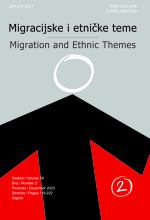The Effect of Motivational Incentives and Time Perspectives on Predicting Youth Emigration Intentions and the Agency of Potential Migrants: The Case of Serbia
The Effect of Motivational Incentives and Time Perspectives on Predicting Youth Emigration Intentions and the Agency of Potential Migrants: The Case of Serbia
Author(s): Nada Polovina, Oliver Tošković, Dragana GundoganSubject(s): Migration Studies, Asylum, Refugees, Migration as Policy-fields
Published by: Institut za migracije i narodnosti
Keywords: emigration intentions; potential migrants’ agency; motivational incentives; time perspective; Serbia;
Summary/Abstract: This article aims to test the predictive potential of frequently researched socio-demographic and motivational incentives and time perspectives as a still unexplored personal-level factor affecting the strength of youth emigration intentions and the agency of potential migrants (i.e., activities related to emigration). We tested the incremental validity of motivational incentives and time perspectives in predicting emigration intention and potential migrants’ agency, after accounting for sociodemographic variables. Furthermore, to strengthen the estimation of the effect of education on outmigration propensity, we included respondents’ grade attainment in their current educational level (upper secondary education), their highest intended level of education, and their parents’ level of education. Drawing on psychosocial conceptualisations (Bandura, 2001; Zimbardo and Boyd, 1999) this quantitative study was conducted on a representative sample of 1973 students enrolled in the final grade of upper secondary schools in Serbia. A three-step hierarchical multiple regression analysis was employed for this purpose. The results reveal that emigration intention, as well as potential migrants’ agency, cannot be predicted only based on socio-demographic characteristics. However, motivational incentives are important correlates of both emigration intention and migrants’ agency. Social motivational incentives tend to reduce both emigration intention and migrants’ agency, while economy-related motivational incentives tend to increase emigration intention and migrants’ agency. On the other hand, while time perspectives are not significantly related to emigration intention, they do appear as significant predictors of migrants’ agency. Concretely, present hedonistic and future time perspective orientations tend to increase migrants’ agency. The findings indicate the need for a more differentiated approach in theoretical, empirical and policy considerations.
Journal: Migracijske i etničke teme
- Issue Year: 2023
- Issue No: 2
- Page Range: 149-181
- Page Count: 33
- Language: English

